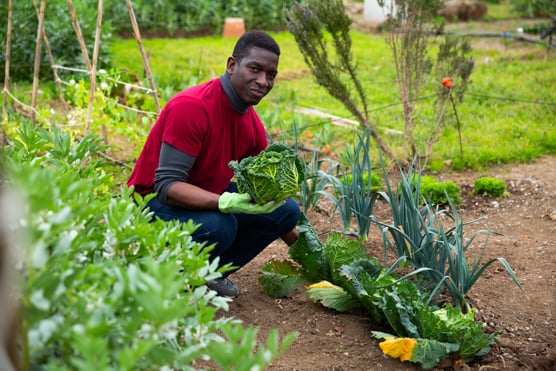The Very Best Gardening Plants for Low-Maintenance and High Compensate
The Very Best Gardening Plants for Low-Maintenance and High Compensate
Blog Article
Unlocking the Benefits of Gardening: A Comprehensive Look at the Various Types and Their Influence On Wellness
Checking out the multifaceted advantages of horticulture exposes a range of practices that dramatically boost private health. As we examine these varied horticulture techniques, it comes to be evident that their influence can reverberate on individual, social, and ecological levels, triggering a more detailed look at how these links create a cohesive narrative of all natural wellness.
Kinds Of Horticulture

Blossom horticulture, another popular category, emphasizes the aesthetic allure of grown flowers. This kind can boost landscapes and advertise biodiversity by bring in useful pollinators. Likewise, herb gardening involves expanding aromatic and culinary plants, contributing both to food preparation and all-natural solutions.
Container gardening offers convenience, making it possible for individuals with minimal space to take part in gardening by making use of pots and planters. This technique is particularly prominent in city setups. Raised bed gardening, on the other hand, involves developing raised stories that improve dirt drain and access, making it simpler for gardeners to manage their plants.
Lastly, community gardening cultivates collaboration among people in common areas, promoting social interaction and cumulative responsibility. Each sort of horticulture offers distinct purposes and caters to various preferences, making gardening a flexible activity that can be customized to individual demands and environments.
Mental Wellness Advantages
Participating in numerous sorts of horticulture not only generates concrete benefits such as fresh produce and beautiful blossoms but additionally uses significant psychological wellness benefits. Research shows that horticulture can be a powerful device for lowering stress and anxiety, anxiety, and clinical depression. The act of often tending to plants and growing a garden fosters a sense of objective and accomplishment, which can boost overall psychological health.
In addition, gardening encourages mindfulness, as it needs people to concentrate on today minute, whether it be planting seeds or supporting growth. This mindfulness practice can bring about lowered rumination and boosted mood security. The direct exposure to natural atmospheres throughout horticulture has additionally been linked to improved cognitive operating and lowered sensations of exhaustion.
Social interaction plays an essential function in mental health and wellness, and community gardening campaigns offer chances for people to attach with others, fostering a sense of belonging. The common experience of horticulture can cultivate friendships and support networks, even more strengthening psychological resilience.
Physical Health Advantages
Several people may not realize that continue reading this horticulture additionally offers considerable physical wellness advantages. Taking part in horticulture activities needs a range of physical activities, consisting of bending, lifting, digging, and growing, which collectively contribute to improved strength, flexibility, and endurance. These activities can enhance cardio wellness by promoting an elevated heart rate, thus minimizing the risk of cardiovascular disease.
Moreover, gardening can act as a moderate-intensity workout, assisting people attain suggested physical task degrees. Studies suggest that routine participation in horticulture can melt considerable calories-- approximately 200-400 calories per hour, depending upon the strength of the tasks carried out. Such calorie expenditure is helpful for weight administration and overall metabolic health and wellness.
In addition, direct exposure to sunshine during horticulture can assist in the synthesis of vitamin D, which plays an essential function in preserving bone health and sustaining immune function. The act of gardening commonly entails working with dirt, which has been connected to prospective mental and physical health and wellness advantages due to the visibility of useful bacteria.
Social Connections Through Gardening
The public facets of gardening foster purposeful social links among individuals. Area yards, in particular, offer as vibrant hubs where people from diverse backgrounds come with each other, growing not just plants however likewise partnerships. These common areas encourage partnership, allowing people to trade knowledge, skills, and sources, consequently boosting their horticulture experience and promoting a sense of belonging.
Involvement in horticulture activities usually results in the formation of friendships and support networks. Participants frequently unify for usual objectives, such as growing seasons, harvest celebrations, or educational workshops, which strengthen social ties and create a feeling of community. Such interactions can ease sensations of seclusion and boost mental wellness, as people discover companionship and friendship in shared endeavors.
Environmental Effect of Gardening
Gardening considerably contributes to environmental sustainability in several methods. One of the most notable benefits is the enhancement of biodiversity. Home gardens offer crucial environments for different species, including pollinators such as bees and butterflies, which are important for community health and wellness. By growing diverse plant species, gardeners can produce a well balanced atmosphere that sustains both vegetation and animals.

Moreover, yards play a crucial duty in water conservation. Well-planned landscapes, including native plants and xeriscaping, decrease water usage and avoid runoff, consequently shielding local rivers from air pollution.
Final Thought

The varied types of horticulture-- including veggie, flower, natural herb, container, and elevated bed-- contribute to mental and physical health and wellness, foster social links, and promote environmental sustainability. By involving in horticulture practices, people can experience improved quality of life while likewise supporting neighborhood bonds and environmental health.
Report this page